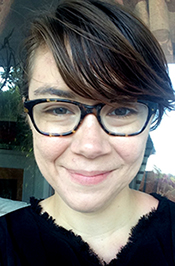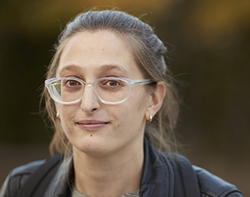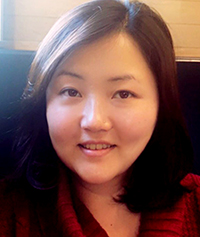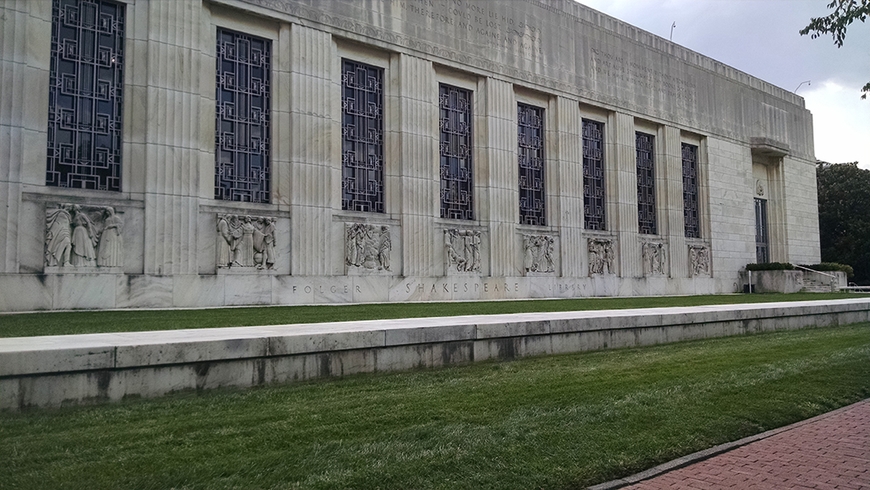Into the Archives, and Beyond: Grad Student Projects
The University’s GRPP program provides $4000 summer research awards for selected English graduate students, who are advised by a faculty member. Below, this year’s recipients describe their projects. (Read more student stories.)

To Santa Cruz with Amy Fairgrieve
Researching a dissertation chapter on Thomas Carlyle, I traveled to the University of California, Santa Cruz. In the UCSC Special Collections, I examined two types of sources: 1) The “UCSC Carlyleans Records,” which contain meeting notes and research produced by an interdisciplinary group of scholars interested in Carlyle; and 2) hundreds of Carlyle’s letters. My larger dissertation project focuses on literary criticism in both the early 19th-century and the present, and the documents on the Carlyleans gave me insight into the process by which groups of scholars discuss, research, and produce scholarship on particular subjects. Carlyle’s letters have been invaluable primary source materials that have helped add detail to the chapter.
I largely completed my research and made good writing progress. It is my hope that the richness of the research—particularly the added details of the Carlyleans’ records, which are unique to the University of California at Santa Cruz but provide more broadly applicable insight into literary-critical and other scholarly processes—will make this chapter in particular a candidate for publication.
To Washington, DC, with Melissa Johnson

I traveled to the Folger Shakespeare Library to conduct archival research within its collection of comic books and graphic novels featuring Shakespeare and targeted at young adult, teenage, and adolescent audiences. The research I conducted has already been applied to a chapter of my dissertation and is forming a paper to be presented at the March 2018 Shakespeare Association of America conference in Los Angeles.
My Folger trip afforded me the opportunity to familiarize myself not just with one of the most important collections for scholars working in the field of Shakespeare studies, but with archival research in general, with which I previously had limited experience. Through discussion and preparation with my advisor, Dr. Katherine Scheil, as well as hands-on experience, I developed important data collection and preservation and time-management skills that will serve me well as I move forward with my scholarship and career.
Furthermore, working within the digital aspect of the Folger’s collection afforded a significant and valuable degree of information regarding digital organization of a large number of texts. I plan to make extensive use of this knowledge as I move forward with the creation of an online database specifically for the purposes of cataloguing all published young adult adaptations of Shakespeare’s works, a resource that does not currently exist but that I believe will be immensely useful to scholars, readers, and educators alike.

To London with Charlotte Madere
At the British Library, I examined materials related to three 18th-century authors: novelist Elizabeth Hamilton, travel writer Eliza Fay, and philologist John Borthwick Gilchrist. In my dissertation, I wish to explore how these authors portray intercultural learning in the colonial environment of 18th-century northern India, especially as a potential means of pursuing mutual curiosity. For example, looking at official records of the founding of the Asiatic Society, a group whose work influenced Hamilton’s fiction, elucidated for me the differences between their engagement with Indian history and literature via affiliation with the British East Indian Company and hers, as an outsider to the field of Orientalist scholarship.
I examined references to Fay’s voyages to and activities in Kolkata in both legal records and a ship log. These documents will form valuable points of comparison for Fay’s own depiction of her life in Original Letters from India (1817), giving me a sharper understanding of Fay’s methods for portraying her subjective experience. I also looked at materials such as language exams from Fort William College, where Gilchrist taught. Although he promoted the learning of Hindustani as a means of fostering commonality among British and Indian personnel in Company armies, the Hindustani exams ultimately reinforce cultural divides by referencing the specific experiences of Company employees learning the language rather than north Indian culture in general.
I am presenting a portion of this research in a paper on Hamilton's Translations of the Letters of a Hindoo Rajah (1796) at the British Women Writers Association's annual conference in April.

In Minneapolis with Bomi Yoon
Over the summer months of 2017, I drafted two chapters of my dissertation. The first will most likely become the introduction or first chapter outlining the theoretical frameworks of racial microaggression and everyday practices and performance studies as well as form the dissertation’s core theme on how racial microaggression (or violence) crosses over daily (everyday life) and extra-daily dimensions (theatre and performances).
The second chapter explores these ideas in Celeste Ng’s Everything I Never Told You. Through close reading, I was able to analyze how silence is used as a literary tool that tells stories in the bestselling novel, highlighting “silent” (or ambiguous and disguised) racism and oppression through instances of everyday practices. This chapter analyzes the nuances of racial microaggression within the text, aiming to understand subtle racism that happens on the subconscious level and identifying how it appears in interpersonal encounters and operates on a systemic and macro level. I was also able to finish drafting a MLA conference paper on the topic, which I presented at the January MLA conference.
In addition, I started writing an MLA article on teaching Asian American young adult literature focused on racial microaggression. This article will be revised and updated with more current teaching experience, as I am teaching ENGL 3301 Asian America through Arts and Culture this spring.



